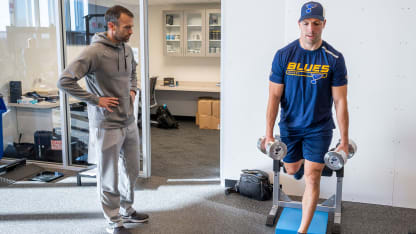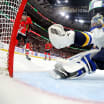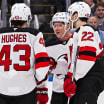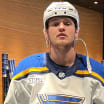Podell joins Blues as new Director of Performance

"Have you heard that analogy where people compare pro athletes to sports cars, like Ferraris or Lamborghinis?" Podell asked. "Well I'm a big believer in that, but I'm not trying to remake their engines to be bigger in most cases. If they already have 1,000-plus horsepower, they don't need a bigger engine - now the focus should be on how to release the parking brake. That's my philosophy, remove limiting factors. As a generalization, at this level it is not always about bigger, stronger, faster - in many instances it's can I remove the restrictions that prevent them from fully utilizing the engine they've already got?"
As far as strength and conditioning / sports science coaches are concerned, Podell has a fine-tuned, tricked-out motor himself.
While pursuing his undergraduate and graduate degrees at Ball State University, Podell managed to secure strength and conditioning internships with the Notre Dame football team, the NHL's Philadelphia Flyers and the NFL's Indianapolis Colts. Two of those teams would later hire him to full-time jobs - he spent six years with the Flyers organization (two with the AHL's Adirondack Phantoms and four with the Flyers) and most recently worked four years in a Sports Science / Conditioning role with the Colts. His resume also includes two seasons as a Sports Scientist with the NBA's Portland Trail Blazers.
This offseason, upon the recommendation of Blues Head Coach Craig Berube, General Manager Doug Armstrong spoke with Ryan to gauge his interest in a role with the Blues. It was an opportunity he ultimately could not pass up.
"It was a great opportunity," Podell told stlouisblues.com. "The organization has had sustained success. They have really good management, really good ownership, really good personnel in terms of the players and a winning culture. I wanted to take advantage of the opportunity to have a leadership role and to bring multiple areas within the performance side of things together. I also get to work collaboratively with a really good medical staff such as (Head Athletic Trainer) Ray Barile, (Assistant Athletic Trainer) Dustin Flynn, (Sport Performance Assistant) James Lomax and those guys."
Podell's day-to-day role with the Blues will be to keep the players in the best physical condition. He will also be responsible for their nutrition, helping to decide the menu for team meals and their chartered flights. In fact, he's less than two weeks into the job and he's already developed fitness programs the players are following right now. Eventually those will be tailored to each player based on their own fitness goals and needs.
"So far, so good," Podell said of his first days with the Blues. "I walked in on the first day and the players said 'Hey, where's our program? Let's get going!' I've been accepted with open arms, the guys have been fantastic. They have been open and receptive to coaching and are willing to learn new things and be challenged in unique ways."
Blues forward Brayden Schenn worked with Podell while with the Flyers and had plenty of high praise for the new guy.
"Podell was great with the guys in Philly. He had great relationships with all the players," Schenn said. "He is innovative and is very hockey-specific. He knows a lot about how to train properly and also how to recover the right way so the players can perform their best. We loved him in Philly, so I'm sure he will have the same kind of effect on us here."
Of course, moving his wife and two kids to a new city, starting a new job and trying to get acclimated with a new team isn't easy in the midst of a pandemic - where uncertainty remains about when the new season will officially begin and what it might look like - but Podell is taking everything in stride.
"The biggest challenge during these times is you have to be extremely adaptable," he said. "The people that are the most adaptable, and the ones that are the most prepared for being adaptable, are the ones that will come out of this situation the most prepared whenever the season does begin. We're laying the foundation we want to build upon, and trying to not escalate it too fast while still having some sustained, gradual improvement and intensity for when the season does commence.
"Being adaptable, and being able to ramp it up when we need to, is key."


















